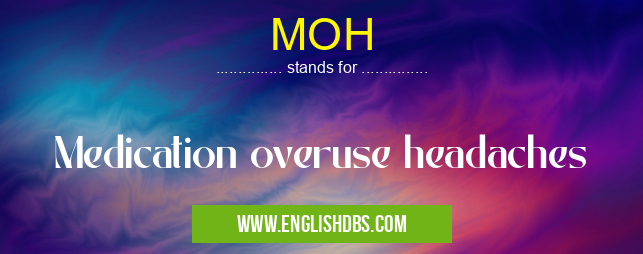What does MOH mean in NEUROLOGY
Medication overuse headaches (MOH) is a type of headache disorder that develops after taking pain-relieving medication too frequently. This type of headache, also known as rebound headaches, can happen if you take any form of pain reliever (including over-the-counter medications) at least three times per week for more than three months in a row. MOH can be chronic and may cause rebound symptoms such as frequent headaches and worsening of original symptoms like nausea or dizziness upon taking the medication again.

MOH meaning in Neurology in Medical
MOH mostly used in an acronym Neurology in Category Medical that means Medication overuse headaches
Shorthand: MOH,
Full Form: Medication overuse headaches
For more information of "Medication overuse headaches", see the section below.
Causes of MOH
MOH is caused by the frequent use of medications used to treat acute migraines or other types of headaches. These medications include triptans, ergots, opioids, barbiturates, muscle relaxants, anti-inflammatory drugs, caffeine and other sympathomimetic drugs. Taking these drugs more than 3 days per week can lead to an increased risk of developing this condition over time. Furthermore, people with certain genetic predispositions may also be at increased risk for MOH.
Symptoms
Most people who suffer from MOH will experience multiple episodes of severe headache pain each week typically lasting between 4 and 72 hours. Other common symptoms associated with MOH include fatigue, difficulty concentrating, sensitivity to light and sound and nausea or vomiting during a headache episode. The intensity of symptoms can vary from person to person but are often more severe in those with longer durations and/or more frequent episodes.
Diagnosis
In order to diagnose MOH, your health care provider will do an exam and ask questions about your headache history including details about when they started, how often they occur and what type(s) of medication you've taken for them. Your physician may also order tests such as blood work or imaging scans to look for any possible underlying causes or conditions contributing to your headaches. After ruling out other potential causes (such as brain tumors), if the doctor suspects MOH they may suggest treatment options tailored to meet your individual needs.
Treatment Options
Treatment options for MOH vary depending on factors such as severity and frequency of symptoms as well as individual lifestyle factors like diet/exercise habits. However some general strategies include reducing frequency/dosage of medications used for treating acute migraine attacks; preventing attacks with preventive medications/therapies; modifying lifestyle factors that trigger headaches; avoiding triggers; using alternative therapies like physical therapy or yoga; seeking psychological counseling; and being patient while waiting out rebound effects caused by stopping medication use habitually used for treating migraine attacks.
Essential Questions and Answers on Medication overuse headaches in "MEDICAL»NEUROLOGY"
What Is Medication Overuse Headache (MOH)?
Medication Overuse Headache (MOH) is a type of headache that occurs when the patient takes painkillers and other medications to treat a primary underlying headache disorder too often. This type of headache can be debilitating and difficult to manage.
What Are the Symptoms of MOH?
The main symptom associated with MOH is chronic daily or near-daily headaches, oftentimes combined with nausea, sensitivity to light, sound and smell. Other symptoms may include fatigue, anxiety, depression and difficulty concentrating.
How Is MOH Diagnosed?
To diagnose MOH, your doctor will review your medical history and medications you’re taking as well as perform a physical examination. Depending on the severity of your symptoms your doctor may also order a CT scan or MRI to rule out any potentially serious underlying causes for headaches.
What Should I Do If I Think I Have MOH?
If you think you have MOH it is recommended that you discuss this with your doctor or another healthcare professional as soon as possible so they can assist in diagnosing and managing the condition. It’s important to be honest about how often you take medication for headaches and explain any changes in Headache patterns you’ve noticed over time.
Can MOH Be Treated?
Yes, there are several treatments available for MOH including avoidance of all substances believed to play a role in worsening headaches such as alcohol or caffeine, lifestyle modifications such as stress reduction techniques or regular exercise, regular visits with a therapist and cognitive behavioral therapy. In some cases medications can be used if deemed appropriate by your doctor.
How Long Does It Take To Treat MOH?
Unfortunately there is no one-size-fits-all answer when it comes to treatment duration for MOH as it depends on factors such as what type of primary headache disorder is present before starting treatment, how severe symptoms are when treatment begins and how motivated patients are in following their prescribed treatment plan. Treatment duration can vary from weeks up to several months depending on individual circumstances.
Are There Any Risks Involved With Taking Painkillers Too Often?
Yes there are risks associated with taking painkillers too frequently, especially over long periods of time; these include addiction due to psychological dependence on the drug, increased risk of liver damage due to regular use of acetaminophen containing drugs such as paracetamol/Tylenol and gastrointestinal side effects related to NSAIDs such as ibuprofen.
Final Words:
Medication overuse headaches (MOH) are a unique type of headache disorder that requires careful evaluation before providing treatment options tailored specifically towards the individual’s needs and lifestyle factors in order to facilitate long-lasting relief from this debilitating condition
MOH also stands for: |
|
| All stands for MOH |
